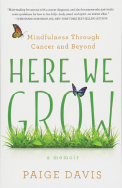BOOKMARK

Title: Here We Grow: Mindfulness Through Cancer and Beyond
Author: Paige Davis
Publisher: She Writes Press
Date: May 2018
Price: $22.95, paperback, 154 pages
Since the publication of Dr. Paul Kalanithi’s best-selling book, When Breath Becomes Air, about his diagnosis of cancer and untimely death at age 37, cancer memoirs have become a staple among book clubs. Written during the last months of his life and finished posthumously by his wife, Dr. Kalanithi details with poetic acceptance the arc of his life and his newborn daughter who plays by his bed as he takes his last breaths. Despite its dark theme of robbed life and fragile mortality, the book sparks conversations that go well beyond most did-you-like-the-book chats over a glass of Chardonnay.
Although most of these memoirs do not come close to the literary heights achieved in When Breath Becomes Air, there is ample room in this genre for simpler narrations about the cancer experience. Such is the case in the new cancer memoir, Here We Grow: Mindfulness Through Cancer and Beyond, by Paige Davis.
Need for Spirituality
The reader first encounters the author—a young entrepreneur whose small company, BlueAvocado, offers products like reusable shopping bags and storage solutions for people to live greener lives—as she attends a meditation retreat with the spiritualist Deepak Chopra, MD, in Southern California. During the session, she learned that Dr. Chopra was a cancer survivor. Her deep conversations with him would later help inform her personal struggle with the disease.
In her opening chapter, the author gives the reader an insight into her psyche and her sense of longing to find meaning in life, despite being young and successful. Shortly after leaving the spiritual retreat, Ms. Davis goes for a long-overdue checkup, and that’s when the book’s drama unfolds. When her doctor comes into the exam room, they chat briefly, and then the author tells her that during a massage, she detected a painful lump in her left breast 4 months ago, which was not true. She writes, “I can’t bring myself to tell my doctor that I felt the lump a year ago. A master of magical thinking, I’d convinced myself it was nothing.”
Naturally, her doctor schedules a mammography and then a biopsy, but Ms. Davis remains optimistic. After all, she is a self-described health nut, who has not eaten dairy or meat for more than 20 years and meditates 30 minutes a day. But then, as she waits for the biopsy results, the fog of memory lifts and she recalls a family history of deadly breast cancer, making the wait even tenser.
Breast Cancer at Age 38
After a lifetime of spiritual healing and wellness efforts, Ms. Davis is faced with a breast cancer diagnosis at age 38. After some emotional turmoil with her new boyfriend and her sister, Ms. Davis comes to terms with her disease and uses it as a launch pad to find peace in the present moment and to find ways to heal from the inside out, as she describes. Readers will be drawn to her spunk and resilience as well as the easy way her prose fills the pages.
Terrific Care Team
A native of Austin, Texas, she goes to MD Anderson Cancer Center for surgery and 6 months of chemotherapy. She has a great team, including a postoperative plastic surgeon. Ms. Davis writes about the much-anticipated visit: “Melissa, my plastic surgeon, came in for her daily rotation. It’s the first time I can bring myself to look down at my chest. She opens my gown and undoes what seem to be miles of bandages, then smiles the biggest smile I’d ever seen. I smile too. She did a wonderful job making me whole again.”
Readers will be drawn to [Paige Davis’] spunk and resilience as well as the easy way her prose fills the pages.—
Tweet this quote
Throughout her ordeal, Ms. Davis is surrounded by an amazing support group of family, friends, and colleagues, and she is careful to mention that she is more fortunate than many women in challenging circumstances. During her traditional therapy, she underwent integrative approaches that are well described, especially from Flint Sparks, a psychotherapist and Zen Buddhist priest. The author does not recommend any diets or cleansing ritual or alternative treatments, although it is clear she leans toward many approaches that are viewed with caution by the oncology community.
Honest and Introspective
She is totally candid about all aspects of her operation, treatment, and recovery, explaining in detail the reconstructive surgery and decisions for her nipple tattoos. Her chapters on chemotherapy are some of the best in the book, bringing the reader into the world of the cancer survivor, with nausea and alopecia. “As I leave the infusion room for the last time, I can’t help think, now what?”
Perhaps the most emotionally difficult part of her book focuses on her decision not to delay her breast cancer surgery to harvest eggs. This step forces her to accept that she will never have children.
Here We Grow is a compact and economically written book, but it is dense with humanity as well as a will to live and give back. Readers of The ASCO Post won’t find technical forays into the complexities of the doctor-patient relationship on these pages, but it is still a powerful reminder that what the oncology community does on a day-to-day basis saves lives and gives hope to those facing a diagnosis of cancer. For that alone, it is a recommended read. ■

